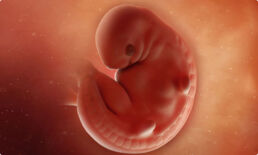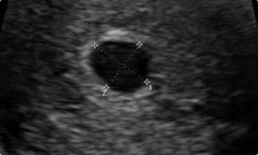Baby's Height
In a 4-week-old baby, ultrasound image can be taken by vaginal ultrasound examination. In a 4-week-old baby, the sac is almost the size of a poppy seed. The 4-week gestational sac consists of amyotic fluid and the baby is seen as a tiny point of 1.5-3 mm in this sac.
Beginning of Pregnancy
Pregnancy is an average period of 40 weeks. The gestational week is calculated starting from the first day of the last menstrual period before conception. Under normal conditions, the average ovulation period in a woman is 6 days.
The probability of fertilization of the egg occurs on average on days 14-3 to 14 +3 starting from the last menstrual period. In this process, the eggs have fully matured to fertilize. Fertilization occurs with the insertion of sperm, which is a male reproductive cell, into the egg, which is the reproductive cell of the woman who has sexual intercourse during the ovulation process or very close to this process. Millions of sperms of the male enter the uterus in as little as 10 minutes, and very few sperm can approach the mature egg between these sperms. This period is 72 hours on average. All approaching sperms gather around the egg. In a singular pregnancy formation, only one sperm wins the race between them and thus fertilization takes place.
Twin and triplet pregnancies occur in the form of identical and separate egg twins/triplets. As a result of fertilization of an egg with a sperm, identical twins/triplets are formed by dividing into two or three zygotes. Separate/fraternal twins/triplets are formed by releasing more than one egg and fertilizing it separately.
The gender formation of the baby is one of the most curious issues. Gender chromosomes are divided into two groups as X and Y. Eggs carry only the X chromosome. Sperms carry an equal number of X and Y chromosomes. With the fertilization of the egg by the sperm with X chromosome, XX, that is, the baby girl, begins to form. As a result of the fertilization of the egg by the sperm with Y chromosome, XY, that is, a male baby, is formed. In this case, it is the sperm that determines the sex of the baby.
Development of the Baby

As a result of fertilization of the egg and sperm, a cell called zygote is formed. This new cell continues to divide, becoming a cluster of cells called blastomeres. And in about 3 days, it moves towards the uterus and settles on the inner wall of the uterus. This cell, which is in three layers to complete the whole body of the baby, starts to become an embryo between 4-5 weeks. When the embryo is formed, the foundation of your baby’s organs has already been formed.
In summary, the baby has not yet been formed in the first week of pregnancy and in the second week of pregnancy. In the third week of pregnancy, the baby begins to form. At the end of the fourth week of pregnancy, the first state of the baby, called the embryo, begins to form.
How to Tell if You're Pregnant? / Pregnancy Symptoms
During this first formation of the baby between 2-3 weeks, the expectant mother will not feel anything. Some women, on the other hand, are very sensitive and understand and feel that they are pregnant before the menstrual date. By the 4th week, some expectant mothers may have a brownish mild spotting. It is stated that this spotting may occur as a result of the placement of the embryo in the uterine wall.
The suspicion of pregnancy generally begins when a woman notices that her menstrual day has passed. In this process, expectant mothers usually perform a pregnancy urine test first. The 3-week pregnancy may not appear on the test, but sometimes a faint line may appear on the test performed this week. A faint line on a pregnancy test means that pregnancy has begun. If pregnancy is detected as a result of the test, it is necessary to see a doctor immediately. A blood test is definitely performed on the expectant mother who applies to the doctor. Looking at the levels of Beta hCG, the pregnancy hormone in the blood, gives an idea of the course of pregnancy. Although Beta hCG value differs in expectant mothers at 4 weeks of pregnancy, normal values are between 3-426 (mIU/L). Beta hCG value increases 1 times every two days. This initial examination is also important to recognize the possibility of an ectopic pregnancy early. Ectopic pregnancy is most common in the fallopian tubes, ovaries, and abdominal cavity.
Ultrasound Image

After fertilization occurs and the embryo begins to form, pregnancy hormones are rapidly secreted in the expectant mother’s body. Fat accumulation can start in the abdominal area of the expectant mother as early as 4 weeks into pregnancy. This rapid tendency for fat accumulation in the body is explained by the body’s precaution against any potential scarcity. Once the secretion of pregnancy hormones begins, there is also an increase in the metabolic rate of the expectant mother. Blood circulation accelerates, and more blood is pumped to the organs.
Among the first signs of pregnancy are fatigue and sleepiness in the expectant mother. Nausea and vomiting can also start after four weeks of pregnancy. It is important for the expectant mother to get enough rest and sleep during this initial period for a healthy pregnancy. There may be abdominal pain in the first weeks of pregnancy. If the abdominal pains increase, a doctor should definitely be consulted. Some expectant mothers may experience groin pains at 4 weeks of pregnancy.
Points need to be considered
The expectant mother who is pregnant will definitely be advised by her doctor to start folic acid supplementation. Folic acid is an important vitamin for the healthy development of the baby’s spinal cord structure. It is recommended to be used without interruption during the first trimester of pregnancy. Women’s health experts recommend women who are planning a pregnancy to take folic acid supplements from the days they plan. Despite this, they recommend that they continue for three months from the start date of the pregnancy.
Expectant mothers who have previously experienced miscarriage, have completed their pregnancy by overcoming the risk of miscarriage, or have experienced problems such as preeclampsia during the previous pregnancy should definitely inform their doctors about this and similar issues at the first examination. In the case of a 4-week miscarriage, the expectant mother does not feel anything important. It gets over this process similar to menstrual bleeding.
The expectant mother, learning that she is pregnant –especially if it is a desired pregnancy- feels feelings of indescribable happiness and excitement. With the instinct to take care of her baby in the best way, she quickly starts to investigate and take precautions. She decides to make some adjustments in his life.
After learning that she is pregnant, every expectant mother should quit her habits such as smoking and alcohol, if any, without wasting time. If possible, it is much more ideal to start this from the period when the pregnancy is planned. If she is routinely taking antidepressants and other drugs, she should inform the women’s health doctor about these issues from the first examination. She should not use any medication during pregnancy without consulting her doctor.
Canbebe on Social Media!
Join our community of mothers and fathers on social media. Be close to caring community, sharing advices between each other on our everyday life with our baby.

